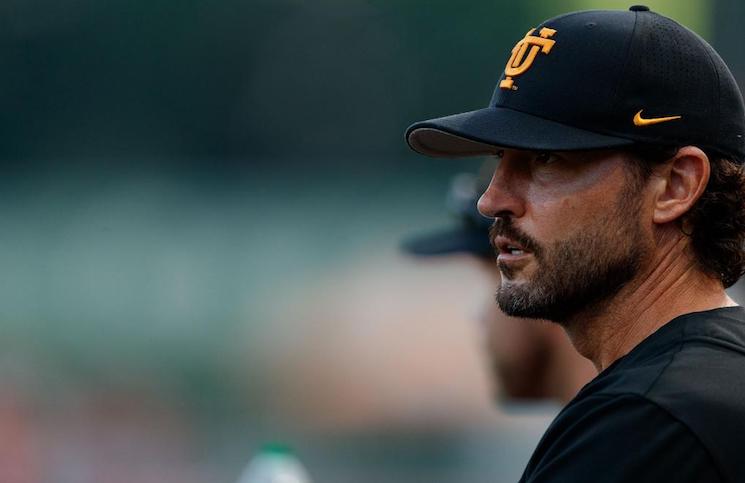
Two-time SEC Player of the year and consensus First-Team All-American Grant Williams isn’t likely to become the next superstar in the NBA. Even with all the accolades he piled up in college, Williams’ game doesn’t look to translate quite as smoothly into the professional level, but that doesn’t mean he’s not worth a high value pick in the upcoming 2019 NBA Draft. In fact, a recent comparison to a current NBA All-Star makes the argument that Williams is definitely worth the investment.
Kevin O’Connor of The Ringer wrote a piece looking at some draft prospects in the 2019 NBA Draft that compare favorably to key role players in the NBA currently. The goal of his article isn’t to try and find the next LeBron James, Steph Curry, or Kevin Durant; instead, he wants to see which prospects look like they can develop into the next Draymond Green, Fred VanVleet, or Kevon Looney.
When you think of the superstars in the NBA, Golden State’s Draymond Green isn’t one of the first names that comes to mind. But that doesn’t make him any less important to the Warriors’ chances of winning an NBA title. He’s a pivotal piece of Golden State’s lineup both on offense and defense, and he’s been a big part of why the Warriors have won three NBA titles the last four years and why they’re playing against Toronto for a chance at a fourth this year.
“Green has a rare blend of skills: He’s a defensive genius who can quickly diagnose plays and has the lateral quickness, strength, and long wingspan to defend players tall and short, thicc and thin,” O’Connor says of Green. “With his ballhandling and playmaking prowess, he uses his brains on offense to make plays for his teammates. There is no other Draymond on the planet. However, there are players who fit the mold.”
According to O’Connor, Grant Williams is one of those players who fits in that Draymond Green mold.
At 6-foot-7, 236 pounds, Williams is almost the exact same size that Green was when he left Michigan State after the 2011-12 season (6-foot-7, 230 pounds). Both were consensus First-Team All-Americans in their final years of college, and Green won the NABC National Player of the Year award and was a finalist for several other Player of the Year awards. Williams didn’t win any National Player of the Year awards, but he was a finalist for several this past season and was a two-time SEC Player of the Year.
There are certainly differences between the two, though. Green has better overall length, sporting an impressive 7-foot-1 wingspan. Williams’ wingspan measured out to be just a smidge under 6-foot-10 at the 2019 NBA Draft Combine. Green was also a better overall rebounder than Williams in college, averaging 7.6 rebounds a game in his college career and 9.7 rebounds a game over his last two seasons. Williams averaged just 6.5 rebounds a game in his 104 career games at UT, including just 6.8 a game over his final two seasons.
But both Williams and Green were exceptional passers at the forward position in college, and both stayed in college for several years and were developed under high-level coaches. Both were even solid three-point shooters when they attempted shots from the perimeter.

It’s because of those similarities that O’Connor views Williams as a potential Draymond Green-type in this year’s NBA Draft. He lumps Williams in with players like Gonzaga’s Brandon Clarke, Auburn’s Chuma Okeke, and Villanova’s Eric Paschall, but O’Connor believes Williams will be the first of that group to be drafted.
“Williams could be the first one of the bunch off the board, though NBA scouts project him anywhere from a mid-first to an early second,” O’Connor writes. “Tennessee ran its offense through the 6-foot-8 junior forward last season; he projects as a complementary offensive player who enhances his teammates with his fundamental screening, passable shooting, and hyperaware playmaking. Williams lacks Draymond’s wingspan, but he shares his hustle, toughness, and IQ.”
Williams’ basketball IQ is something that O’Connor — and others — have hammered home as a huge plus in his favor. Whether it was on offense or defense, Williams displayed a knack for dissecting plays and making the smart decision more often than not.
That kind of ability can make up for a lack of explosive athleticism, too.
“The NBA is full of athletes who can make you question the laws of physics, but the players who historically earn important minutes deep into the postseason are also the ones with high basketball IQs who make smart, quick decisions and decisive cuts, passes, and rotations,” O’Connor explains. “A dial-up basketball IQ doesn’t get it done.”
Just because O’Connor believes Williams fits that mold doesn’t mean Williams will have the same type of career that Green has had in the NBA, though. In fact, it took Green a little while to come into his own in the NBA. He wasn’t viewed as a future All-Star himself out of college.
Green was selected with the 35th overall pick in the second round of the 2012 NBA Draft. In his first two years with the Warriors, he only made 13 total starts and averaged 17.8 minutes a game. It wasn’t until his third season in the league when he started all 79 regular season games he played and averaged 31.5 minutes a game that he really blossomed.
That year, Green averaged 11.7 points, 8.2 rebounds, and 3.7 assists while making 33.7 percent of his threes. Since then, Green has averaged right around those same totals for most of his career, with his assist numbers sky-rocketing up to seven assists per game over the last four seasons.
Green’s defense is what separates him from others, though. He’s an elite-level defender who is a three-time NBA All-Defensive First Team selection, and he won NBA Defensive Player of the Year in 2017.
Williams was an exceptional blocker for the Vols in his three years at UT, but he still needs to improve in some areas on defense. If he can, then that will help him immensely.
“If Williams doesn’t succeed as a playoff-caliber rotation player, it won’t be for a lack of skill or intelligence,” O’Connor states. “It’ll be because his mobility defending guards didn’t develop enough for him to reach his ceiling as a versatile defender.”
Wherever Williams ends up, he’s not likely to make a huge impact in his first couple years. But assuming he applies the same work ethic in the NBA as he did at Tennessee, then there’s a good chance he develops into a solid role player for a successful team. And maybe he’ll even become comparable to Draymond Green.



